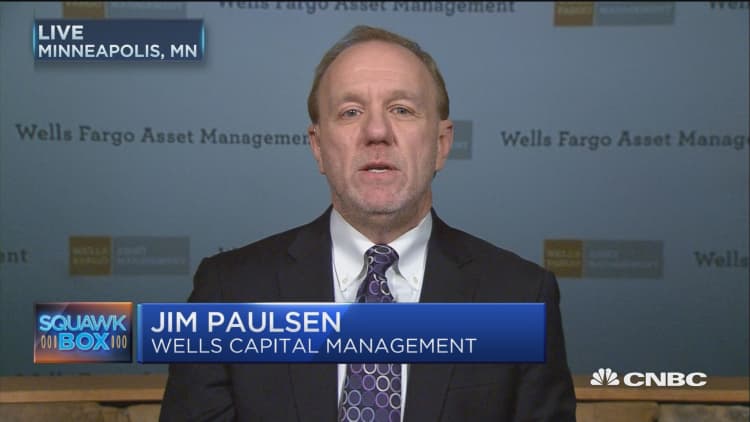
The U.S. stock market's reaction to Britain's vote to exit the European Union shows it might not be the financial or economic crisis — "even if others start to leave" — that investors had first feared, closely followed market watcher Jim Paulsen told CNBC on Friday.
The chief investment strategist at Wells Capital Management called the departure vote a "wimpy crisis," judging by the three-day bounce back that's erased about 90 percent of the post-Brexit losses for the Dow Jones industrial average and the .
In the two trading sessions after the June 23 Brexit vote, global financial markets had racked up more than $3 trillion of paper losses, according to data from S&P Global. About $1.3 trillion of that red ink had came from U.S. markets alone.
Paulsen said on "Squawk Box" that the Brexit vote is certainly a political calamity, which could create more volatility down the road.
"[But] as crises go, the reaction of Mr. Market here to this one has been pretty wimpy. It's not only the rapid recovery of financial markets. It's really the initial reaction even," he said, arguing the S&P 500's rout was mostly a reversal of the runup ahead of the vote.
Stocks had been gaining ground before Britons went to the polls on what turned out to be the shockingly wrong notion that the stay camp would prevail.
"Maybe it turns out the market wasn't wrong. They were wrong about the vote, but maybe they weren't wrong about the impact of Brexit," Paulsen said, arguing there's still a chance the actual departure of the United Kingdom from the EU might not happen.
Making the case for that possibility, he pointed to the online petition with more than 4 million signatures as of Friday morning, calling for a second referendum.
Another possible option, according to Paulsen, is Britain might be able to negotiate an exit with similar trading and economic benefits as it enjoys now as an EU member. "I'm not sure the final result [of Brexit] is going to be much different. So why should the market react?"
On Monday, with Wall Street piling on Brexit losses for the second session in a row, Paulsen told CNBC that investors should take advantage of the panic. He also correctly predicted the "emotional intensity" would be short-lived.
Ahead of Friday's trading on Wall Street, the start of the third quarter, the Dow and the S&P 500 were up about 3 percent and 2.7 percent, respectively, for the first half of the year. The Nasdaq, however, was off about 3.3 percent in 2016.
The Dow and S&P 500 were up in the second quarter for the third three-month period in a row.


